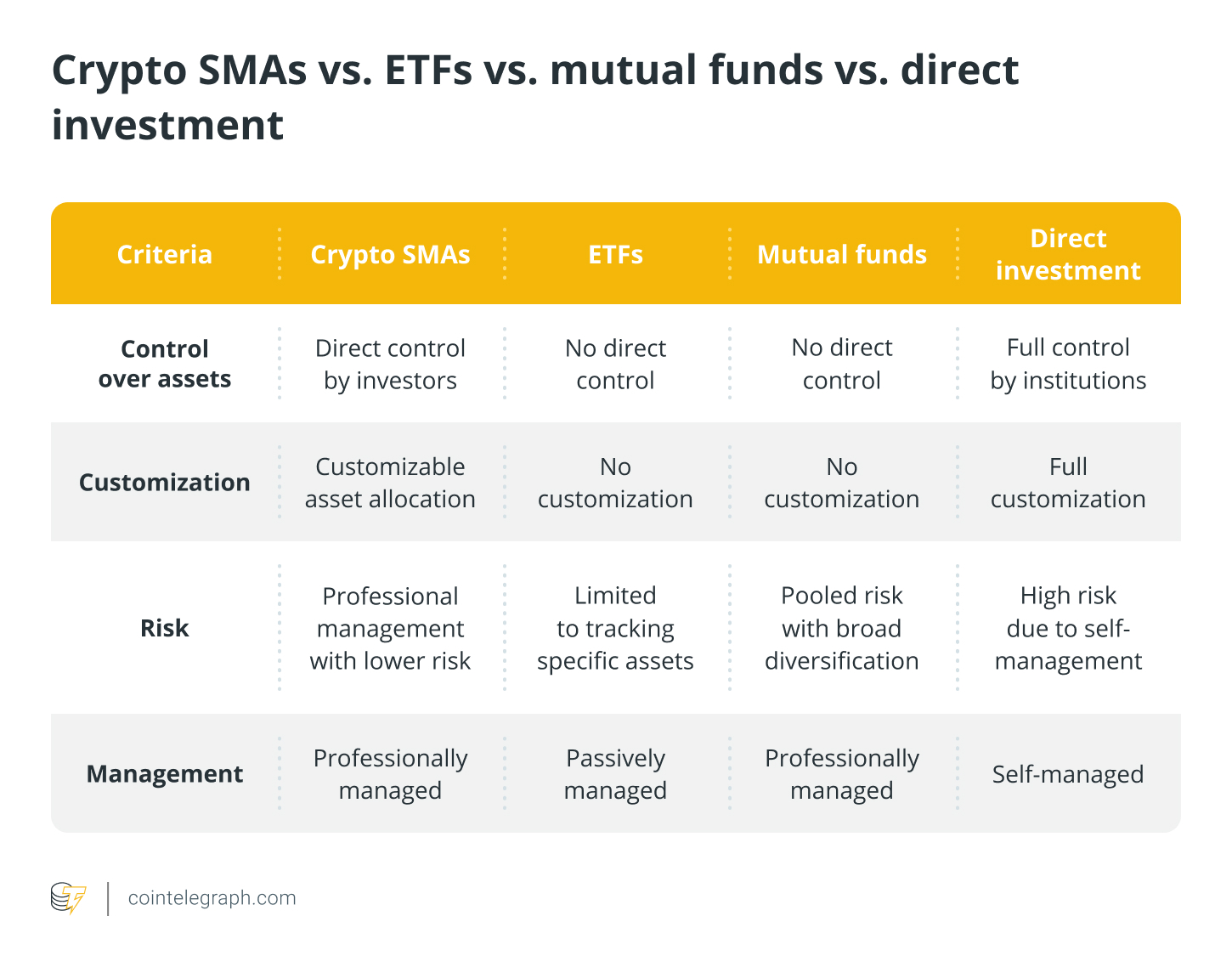Key takeaways
- Crypto separately managed accounts (SMAs) aid institutional crypto adoption with a tailored approach and expertise of professional investment managers.
- Institutional investors gain key benefits in their crypto investment strategy with opportunities for tax optimization, asset diversification and 24/7 crypto trading.
- Coinbase and Bitwise both work with financial advisers to offer SMAs for institutional crypto strategies combined with security and regulatory compliance
- Challenges of regulatory uncertainty, volatility and liquidity still put many institutions off investing in crypto SMAs.
Crypto SMAs have emerged as a shiny investment vehicle for institutions. Companies are increasingly exploring opportunities to add cryptocurrency to their portfolio. The launch of crypto exchange-traded funds (ETFs) is making it straightforward for new investors to enter the market without the complexities of direct ownership, but this comes with drawbacks.
For institutions, SMAs offer direct ownership of digital assets to customize and manage risk within a portfolio.
This article delves into crypto SMAs, their advantages, drawbacks, and whether they’re right for your institution’s move toward decentralized finance (DeFi).
What are crypto SMAs?
A crypto SMA is a portfolio of digital assets actively managed by a professional investment manager. It offers tailored crypto investing for institutions to hold and manage cryptocurrencies directly. Working with financial advisers, investors can easily build a customizable basket of digital assets.
According to a 2024 survey from Bitwise and VettaFi, 88% of financial advisors received questions about crypto due to the potential for high returns and diversification. While financial products like spot Bitcoin (BTC) ETFs take the headlines, SMAs offer more bespoke portfolios, risk management and ownership of assets.
How crypto SMAs work
SMAs are managed by professional investment managers who make decisions based on cryptocurrency market analysis, risk management and investor objectives.
The investor retains ownership of the underlying crypto asset. SMAs are customizable in several ways, including crypto asset allocation, investment selection, return benchmarks and tax management.
They can operate in several ways, but usually, it requires outlining investment goals with the manager and then funding the account. The fund manager creates an investment strategy before investing in the agreed-upon assets. The account is regularly reviewed and adjusted based on crypto market trends.
Advantages of crypto SMAs for institutions
So, why are Crypto SMAs attracting so much attention from institutional investors? Well, financial advisers are steadily adopting this investment vehicle for several key benefits:
- Direct ownership: Maintaining direct ownership of assets gives institutions control and transparency of investments, including round-the-clock liquidity, so investors and managers can rebalance at any time. This is a particular advantage of the crypto market, which trades 24/7, unlike traditional finance markets.
- Professional management: The digital asset market evolves quickly and is difficult for institutions to keep up with. Professional digital asset management is becoming increasingly valuable in maintaining a strong portfolio allocation.
- Tax optimization: The volatility of the crypto market creates tempting tax optimization opportunities. SMAs open up routes to offset tax with strategies like tax-loss harvesting during crypto’s ups and downs.
- Reporting integration: Wealth managers integrate crypto SMAs directly with reporting platforms like Orion and Black Diamond. Whether it’s a simple Bitcoin investment or altcoin performance, advisers can seamlessly report and model the institution’s digital asset portfolio.
- Institutional custody: An adviser’s ability to use institutional-grade asset custodians can mitigate security risks and minimal financial protections with cryptocurrency. Custodians provide cold storage, trading and security, as well as maintaining system and organization controls (SOC) 1 and SOC 2 auditing procedures.
SMAs are attractive investment vehicles, but how do they compare to other investment options?
Did you know? You can use crypto investments to harvest tax loss. This allows you to sell an investment that has lost value to offset capital to lower your tax bill.
Comparing crypto SMAs to other investment vehicles
As cryptocurrency continues its march into the financial world, the number of investment vehicles grows alongside. ETFs, mutual funds and direct investment each have pros and cons compared to SMAs.
- ETFs: These are standardized pooled investment vehicles where investors have no control or ownership over the asset allocation. Crypto ETFs track the market and tend to only pool a small range or single asset such as Bitcoin or Ether (ETH).
- Mutual funds: Similar to SMAs, these are professionally managed funds, but investors don’t have an individual custom allocation or asset strategy. This investment vehicle pools money from various investors to buy assets on everyone’s behalf.
- Direct investment: Institutions that trade their cryptocurrencies directly obtain full control over their assets. They take on the risk of security, storage and investment strategy. This lacks the professionalism of an SMA, exposing extra risk.

So, when a professional investment manager is involved, what does that mean for risk?
Did you know? In 2024, BlackRock launched a spot Bitcoin ETF that grew to become the world’s largest Bitcoin fund with over $20 billion in assets under management, dethroning the Grayscale Bitcoin Trust.
Risk management and compliance considerations
The beauty of crypto is that anyone can buy and sell it with an internet connection and a smartphone. Still, institutions can’t be so cavalier, and SMAs help invest large amounts of funds responsibly.
SMAs offer bespoke diversification strategies and continual management to mitigate market volatility and market outlook. This helps to protect against losses and hit investment goals.
Adding to this, investment managers must be experienced and licensed operators. In the US, the Securities and Exchange Commission oversees the registration of advisors. Registered advisers must be up-to-date with regulatory compliance and policies to protect clients.
Potential challenges of adopting crypto SMAs
There are many things to like about crypto SMAs, but their adoption still faces headwinds. Regulatory uncertainty makes navigating the evolving legislation complex for companies. SMAs can help to manage this professionally, but changes to crypto regulation could still impact investments in unforeseen ways.
Volatility and liquidity concerns are also issues, with institutions worried about the ability to buy or sell quickly to avoid damaging losses. The technical and operational aspects of crypto investing add more doubt to investors’ minds.
Case studies and examples
Crypto SMAs have been around for several years, with some notable examples in the financial industry.
Coinbase, the largest crypto exchange in the US, operates SMAs to offer managed solutions to institutions. It gives them access to a range of passive and active digital strategies with a qualified custodian.
Bitwise is another example, with its SMAs offering direct exposure to Bitcoin and Ether since 2022. This enables financial advisors to offer institutional and retail investors direct ownership of the two largest crypto assets.
Did you know? Coinbase often has over eight million monthly users and holds over $330 billion worth of assets on its platform, 67% being Bitcoin and Ether.
Tailored crypto SMAs for institutional investors
Institutional investors can enjoy significant advantages of investing in crypto with an SMA, including customization, tax efficiency and professional management. They deliver a strategy tailored to their goals and requirements, which helps to keep their shareholders happy with returns and risk tolerance levels.
Even so, crypto portfolio management needs to balance against the challenges of market volatility and regulatory uncertainty. An experienced investment manager helps navigate these elements effectively.
Written by Marcel Deer


